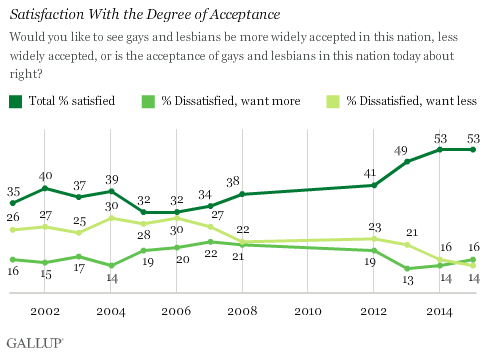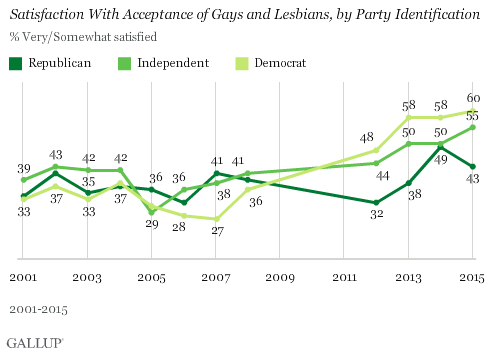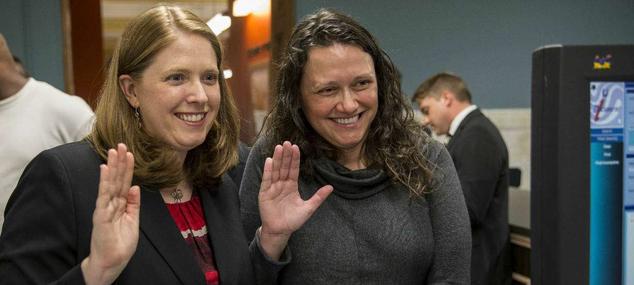Story Highlights
- Satisfaction still well above previous levels in last 15 years
- Sixteen percent dissatisfied with gay acceptance, and want more
- Fourteen percent dissatisfied with gay acceptance but want less
WASHINGTON, D.C. -- Against the backdrop of the Supreme Court's recent decision to accept four cases involving whether states can constitutionally prohibit same-sex marriages, a slight majority of Americans (53%) say they are satisfied with the acceptance of gays and lesbians in the U.S. This level is the same as last year but remains higher than those Gallup has measured over the past decade.

Acceptance of gays and lesbians is one of two issues that saw zero change in Americans' satisfaction levels from the previous year in Gallup's annual Mood of the Nation poll, conducted Jan. 5-8. Only recently have a majority of Americans said they were satisfied with the state of acceptance of gay and lesbian people in the country, surpassing the 50% mark last year for the first time. However, since 2005, satisfaction has grown more on this than any other issue that Gallup has asked Americans about.
In May 2014, Gallup found that 58% of Americans felt gay and lesbian relations were morally acceptable. But Americans' personal opinions about homosexuality do not dictate whether they are satisfied with the current level of acceptance toward it.
Americans Who Want Less Gay Acceptance on the Decline
In a follow-up question that probed Americans who are dissatisfied with the current acceptance of gays for their position, 16% of Americans indicate they want to see more acceptance while 14% want less. Another 10% are dissatisfied, but don't have a preference for whether there should be more or less acceptance.
As the percentage of Americans satisfied with the acceptance of gays and lesbians has increased markedly since the mid-2000s, there has been a much greater drop in the percentage who are dissatisfied and want less acceptance of gays and lesbians, from 30% to 14%, than of those who want more acceptance, 20% to 16%.

The general trend suggests that over time, fewer Americans are dissatisfied because they want less tolerance, and more classify themselves as satisfied. The percentage who are dissatisfied because they want more tolerance has remained fairly stable. This may indicate a broad pattern by which Americans who previously wanted less tolerance of gays and lesbians have become more likely to accept the situation as it is today.
Democrats Remain Most Satisfied With Gay Acceptance, Republicans the Least
Sixty percent of Democrats say they are satisfied with acceptance of gays and lesbians, slightly more than independents (55%) and considerably more than Republicans (43%). Those are the highest measures to date for Democrats and independents. Republicans' satisfaction is down from last year, likely explaining the lack of change in overall satisfaction.

Americans who identify with the GOP have been least satisfied with gay acceptance since 2012 -- an election year that saw the first pro-same-sex-marriage presidential candidate as well as the first openly gay U.S. senator elected to office. Unlike independents and Democrats, Republicans' satisfaction has never reached the 50% mark.
From 2001 to 2008, when few states recognized same-sex marriages, Democrats were generally the least satisfied with gay acceptance. But the issue didn't see large differences between parties until 2007, when Democrats and Republicans were separated by 14 percentage points -- the first double-digit difference in opinion between those who affiliate themselves with the two parties.
Bottom Line
To many pro-gay supporters, 2014 was a "banner year" in gay rights as the number of states allowing marriage equality nearly doubled. And while support for same-sex marriage may have inched higher, the events of 2014 didn't sway Americans' collective levels of satisfaction with acceptance of gays and lesbians. While the Supreme Court's decision this spring could put an end to the issue of the constitutionality of same-sex marriage once and for all -- or breathe new life into a movement that opposes it -- the news might not budge Americans' satisfaction with gay acceptance.
Marriage equality supporters may be satisfied with the string of legal victories at both state and federal levels. Satisfaction with acceptance could also come from an increased exposure of lesbian, gay, bisexual and transgender (LGBT) people in the media. Conversely, some supporters of LGBT equality could be dissatisfied with the 14 remaining states that have not legalized same-sex marriage, or disheartened by state legislation to allow businesses to turn away gay customers on the basis of religious liberty.
Those who oppose marriage equality and other issues important to the gay community could easily feel dissatisfied with gay acceptance related to massive legal battle losses and other high-profile gestures of support for gay people. They could be satisfied, however, if they live in a state where gay marriage is still illegal, or if they feel emboldened by elected officials who continue to fight its legalization.
Survey Methods
Results for this Gallup poll are based on telephone interviews conducted Jan. 5-8, 2015, on the Gallup U.S. Daily survey, with a random sample of 804 adults, aged 18 and older, living in all 50 U.S. states and the District of Columbia. For results based on the total sample of national adults, the margin of sampling error is ±4 percentage points at the 95% confidence level. All reported margins of sampling error include computed design effects for weighting.
Each sample of national adults includes a minimum quota of 50% cellphone respondents and 50% landline respondents, with additional minimum quotas by time zone within region. Landline and cellular telephone numbers are selected using random-digit-dial methods.
View survey methodology, complete question responses, and trends.
Learn more about how Gallup Poll Social Series works.

